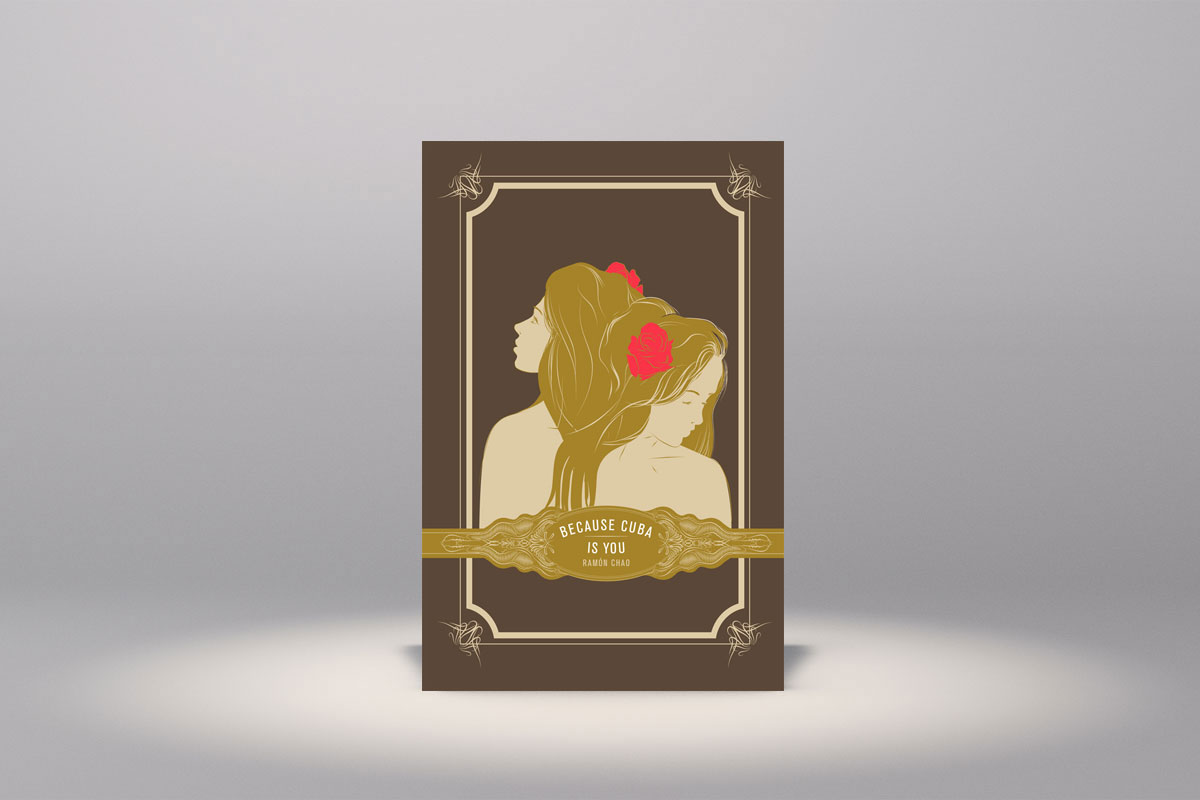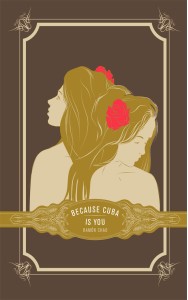In this extract from Because Cuba is You, Lola is taken to a ñáñigo feast where she is blessed with the gift of ubiquity: the power to be in two places at once.
THE DANCERS SETTLE THEMSELVES on the ground; there is no leader, nor set dance. Unconnected notes emerge and are transformed into melody. The other musicians set the tempo and the tone. The dancers stand where they wish, make rhythmic movements, shaking their heads in time to the music. Gradually they seem to be intoxicated by the cadence, which gets faster and faster, accelerating at regular intervals, becoming more and more demonic, moving in a trance until they reach a real frenzy.
The uniform tempo at which they jumped, twirled and twisted was astonishing. The rhythms followed on seamlessly, one after another, increasingly fast and noisy, until the final apotheosis. Dancers and spectators both were left gasping. Then suddenly the music and dancing stopped; the dancers rigid in their last positions. For a few seconds, absolute silence reigned.
Nothing, no noise, no breathing. Then the drums start again, double in number and intensity. As eyes grow accustomed to the dark, a woman appears, in a skirt of palm leaves, nude from the waist up. She stands stock still in the centre of the circle, on her head a crown of zebra mane, two strips of skin across her breasts and arms. A fringe of cloth covers the front of her thighs, and hangs down to her ankles at the back.
She came and stood beside me, her whole face illuminated in the darkness by the two glowing coals of her eyes, like those of a tiger that gleam in the night and, it is said, lead the way to death and destruction.
‘No doubt you lost your way tonight and accidentally stumbled upon this place, from whence leaving intact is the best of the mercies you can expect. Because you are in open country here, we have only to utter a single cry and four thousand spirits will come and carry you away. But that is not the fate awaiting you.’
The dancer began to move her hips by shaking her belly, and by so doing, slowly, edged towards me. She led me into the circle, and I, overwhelmed by a feeling of infinite tension and greatness, could no longer think, or know how to act. She took off my light bodice and clutched me against her, skin to skin. I noticed she was smeared with a paste-like substance which held us together, and we began to dance in unison. The drums and guttural cries of the musicians intensified. Joined to the dancer, I followed the tempo of her feet, her shuddering and convulsions. We calmed down slowly like Siamese twins, but to the same throbbing beat of the drums, and detached ourselves, our skin sticking painfully, as if we were leaving half of each other’s bodies behind. Old women embalmed us with plant extracts and we lay exhausted for I don’t know how long, until the timpani faded away.
‘Tell me the oath you wish me to make for you. The one you think commits and binds you most, and I will not come to you until you feel the need, and tell me, “Go, let us start fighting.” Swear to me, by He who put souls in bodies and created the laws of the Universe, that you will not use this power except for good, and in cases of extreme need.’
By all the saints! No priest, not even the Pope of the Catholics, made me swear an oath, or impose one of such gravity on me.
Nonetheless, she gives the dancer the oath she asks for and follows her indications as to how to swear it, then sinks into the sea of reflections.
‘In truth, your request is something I have never granted anyone, and your destiny has willed it. But I would ask you one favour.’
‘What is it?’
‘Stay with me like this for fifteen minutes, breath to breath, pulses and heartbeats in unison. I will help the other Lola you carry within you to emerge, and both of you, like all beings that are chosen, will set out to walk parallel paths.’
I read something unimaginable in the dancer’s face. I felt too weak to walk. And to discover what I felt that night I would have to read, who knows, all the stories in the world for a thousand and one nights.
SHE WALKED FOR A COUPLE OF HOURS, step after automatic step, till she reached her door. She found it locked and lay down in the doorway, so discouraged she did not know what was happening around her. Soon Monguita came out, and taking her in her arms, she carried her to bed.
She took care of me until I recovered. Then I threw myself in her arms and told her all about the dancer, from beginning to end, the way she had held me tightly to her body, and I had done nothing to extricate myself.
‘Cheer up, my girl, leave your troubled mind behind. Go home for a year, or two, or three, until your breast fills with joy and your spirits rise. Mother Yemanyá willed that you live and see your homeland again. The sailors are busying themselves preparing the voyage and the boat will leave here in three days for one of the ports in Galicia. From there, in three days on foot, you can reach your village of Lanzós, where your mother is waiting to see you before she dies.’
‘Not before time, Monguita. Since the day I left my country, I’ve had tears in my eyes and a heavy heart. I have not known if I would get the chance to see the land of my birth again and die beside my mother, and, if the truth be known, I’m tired of all that I have lived in this vale of tears. And also, Monguita, the dancer told me something I must cherish.’
‘When Changó appears to you, control bids you farewell. You have the gift of ubiquity, a unique and terrible gift at the same time. It is a power you cannot pass on; it lies dormant within you and you don’t know when it will come out. You will have to defy the gods!’

